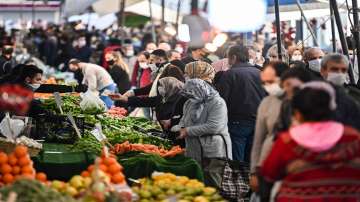Yearly inflation in Turkey hit 61.14 percent on Monday, climbing to a new 20-year high and deepening a cost of living crisis for many households. The Turkish Statistical Institute said consumer prices rose by 5.46 percent in March compared with the previous month. Yearly inflation was up from 54.44 percent in February.
The highest yearly price increase was in the transportation sector, at 99.12 percent, while the increase in food prices was 70.33 percent, according to the data. It was the biggest year-on-year increase since March 2002. Rising prices are part of an economic crisis exacerbated by the Covid19 pandemic. Meanwhile, Russia's invasion of Ukraine has seen a surge in gas, oil and grain prices.
Turkey's runaway inflation also follows a series of interest rate cuts late last year, in line with President Recep Tayyip Erdogan's opposition to high borrowing costs in a bid to boost growth, investment and exports. In contrast to established economic thinking, the president insists that high rates cause inflation.
The central bank cut rates by five percentage points between September and December but they have remained unchanged at 14 percent this year. The lira, which lost 44 percent of its value against the US dollar last year, plunged to a record high of 18.41 against the greenback in December. The currency's performance has fuelled inflation in the import-reliant Turkish economy. In an effort to soften the blow on households, the government has implemented tax cuts on basic goods and has adjusted electricity tariffs.
ALSO READ | 6 killed, 12 others injured in Sacramento's second mass shooting
ALSO READ | Sri Lanka's Cabinet Ministers resign with immediate effect amid economic crisis
Latest World News
